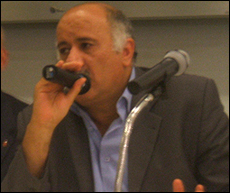 I met Jabril Rajoub, senior Fatah member five years ago in Jerusalem which is why last week’s news item on May 1 about Rajoub caught my attention. According to Iran’s IRNA news agency, Rajoub suggested that Fatah seek closer bilateral relations with Iran.
I met Jabril Rajoub, senior Fatah member five years ago in Jerusalem which is why last week’s news item on May 1 about Rajoub caught my attention. According to Iran’s IRNA news agency, Rajoub suggested that Fatah seek closer bilateral relations with Iran.
“The senior Fatah official hoped Palestinians would witness freedom of their lands by continuous support being offered by Iran and other supporters of Palestine as well,” IRNA said.
According to the Jewish Weekly Review, “Officials said Iran and Hizbullah were seeking to co-opt members of the Fatah leadership, particularly the Central Committee. They said the campaign was meant to prod the ruling Palestinian movement into a diplomatic relationship with Teheran.”
http://www.jwr.net.au/iran-forges-alliances-with-key-palestinian-leaders-in-west-bank/
Rajoub made his statements in a meeting with Iran’s ambassador to Lebanon, and The PA ambassador to Lebanon was also present.
Just in case anyone thought that the PA was attempting to moderate its positions, Rajoub’s statement should provide a reality check.
Rajoub previously served as the head of the PA’s Preventative Security Force and as a young man he spent 15 years in prison in Israel for terrorist activity, until he was freed in a hostage exchange.
In late 2012 he called for armed resistance against Israel. However, in February 2013 he told Israeli government radio that the PA will not initiate a new “Intifada” terror war.
In light of Rajoub’s suggestion that the PA get closer to Iran, I am re-running below the piece I wrote in August 2008 about an event where Rajoub spoke sponsored by Canada’s Ambassador to the Palestinian Authority.
Although Rajoub did try to present himself as a moderate at times throughout that event, I will never forget when he suggested that the Palestinians ought to get a state even before they had shown on the ground that they could and would control terrorism. I raised my eyebrows when he said it. Somehow I am not now surprised that he is suggesting that the PA cozy up to Iran.
Below is the article I wrote almost five years ago published in the Vancouver Jewish Independent:
Jerusalem- Canada’s Ambassador to the Palestinian Authority, David Viveash told an audience of Israelis and Palestinians in East Jerusalem that he was “absolutely convinced that governments don’t make peace, people do.”
Viveash, who has been based in Ramallah for the last three years spoke at an event at the end of August at the Notre Dame Center in East Jerusalem under the auspices of the Canadian International Development Agency entitled “1948: Sixty Years After Independence/Nakba…What is Next ?”. The event was organized by the Palestine-Israel Journal, which is co-edited by Hillel Shenker and Ziad AbuZayyad, and features an equal number of Israeli and Palestinian academics who contribute to it.
 Colette Avital, Deputy Speaker of the Knesset (Labour) and Jibril Rajoub, former National Security Adviser to the PA President Abbas each spoke at the event providing analysis of the current political situation.
Colette Avital, Deputy Speaker of the Knesset (Labour) and Jibril Rajoub, former National Security Adviser to the PA President Abbas each spoke at the event providing analysis of the current political situation.
Viveash, who is retiring this month from his position, said that “[Canada believes] it is important to develop public awareness and understanding of the narratives that each party brings to the negotiating table. That’s why the work the Palestine-Israel Journal does is so important…. It exposes each side to the other side’s view.”
“On behalf of the Canadian government, it is a great pleasure to support the Palestine-Israel Journal’s efforts in helping people make peace,” he added.
In his remarks Rajoub, who is also the former head of the PA Security forces, said that “I recognize the state of Israel within the 1967 borders.”
But, he said, “I think that after Rabin’s assassination Israel started to undermine the authority of the PA and focused on expanding settlements and doing the utmost to strengthen settlements in East Jerusalem.”
Rajoub also said that he thinks that the Israeli condition of “putting security first has failed all of the time”, and it must take into consideration the Palestinian side’s need for a state even before the PA controls terrorism. “I don’t think that security first can be the issue while on the ground you are undermining everything.”
When asked about Rajoub’s comments suggesting that Palestinians ought to be granted a state before the PA controls Palestinian terrorism against Israel, Avital said, “No I don’t agree with it [Rajoub’s view]. If you have security for both sides, then confidence will follow, but not if you have it for one side, and not the other side. Both sides must have security [before proceeding forward].”
Regarding Hamas, Rajoub said, “I was in the Palestinian National Assembly when we decided on letting Hamas run in the Palestinian elections. Our assessment at the time was that most of the Hamas leadership was pragmatic and would recognize facts on the ground. For this reason and others we did give the green light for Hamas to run in the elections [in 2006].”
He added, “It is our problem that Hamas defeated Fatah in the elections… [But] I believe all parties made a fatal mistake in not recognizing the results of this election.”
On the issues of corruption and democracy, Rajoub said “Corruption exists everywhere. We [in the PA] made mistakes at the beginning-we arrested Palestinian journalists. We were a newborn entity. I am pretty sure we made a lot of violations of human rights. Having a third party to monitor and help the Palestinian regime is part of our strategy for the future.”
Rajoub also said that any future reconciliation agreement between Hamas and Fatah would have to detail “on agreement on how to settle the [Israeli-Palestinian] conflict. Hamas should answer whether it wants a bi-national state, one state, two states, or three states. We would have to come up with one political platform which I think is a two state solution.”
In her remarks, Avital said, “My information, which comes more from Palestinian sources, is that there has been progress [in the negotiations between the Olmert government and the PA] and the fact is that everything is being discussed, including Jerusalem. But I don’t think that in today’s political reality, anyone would give credibility to any agreement reached by a Prime Minister [Olmert] that has been so discredited publicly.”
Avital also stated that “according to the knowledge we have at least 80% of the people in the settlements are willing to come back [to pre-67 Israel] if provided [appropriate] compensation.” She added that if such a law providing compensation were enacted by the Knesset, “I think that it would create a dynamic that would be helpful.”
She also indicated that it was important to reach an accord that would provide the Palestinians with an independent state soon. “The more we postpone this state, the more we see a trend in Palestinian society that says we don’t want a two state solution, we want one bi-national state [in which Palestinians will eventually be a majority].”
Avital also said that although she was herself not prepared to enter into “second track meetings or negotiations with Hamas”, she believed that “there are Israelis who are willing to do this.”









